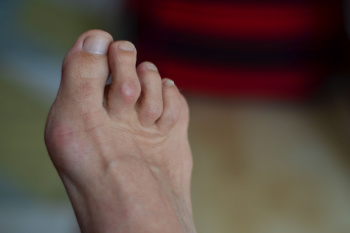Items filtered by date: January 2025
Arthritis Can Cause Pain in the Feet and Ankles
Explanation of Hammertoe

Hammertoe occurs when one or more of the smaller toes become bent in a Z-shaped position, due to an imbalance in the tendons or poor joint alignment. Common causes of hammertoe include wearing ill-fitting shoes, having unusually long toes or metatarsal bones, or conditions like rheumatoid arthritis. The second toe is most frequently affected, but the third and fourth toes can also develop into a hammertoe. This deformity often results in discomfort when wearing shoes, especially those with a narrow or low-toe box. Excessive friction on top of the affected toe can lead to calluses, corns, or even ulcers. In some cases of hammertoe, pain in the ball of the foot, known as metatarsalgia, develops. A podiatrist can diagnose hammertoe through an examination of the foot while assessing other joints for arthritis or other underlying conditions. Treatment options include custom orthotics to reduce pain or surgical correction for rigid deformities. If you have developed a hammertoe that is causing discomfort, it is suggested that you make an appointment with a podiatrist for an exam and treatment options.
Hammertoe
Hammertoes can be a painful condition to live with. For more information, contact Dr. Michael A. Wood from Foot Health Institute. Our doctor will answer any of your foot- and ankle-related questions.
Hammertoe is a foot deformity that affects the joints of the second, third, fourth, or fifth toes of your feet. It is a painful foot condition in which these toes curl and arch up, which can often lead to pain when wearing footwear.
Symptoms
- Pain in the affected toes
- Development of corns or calluses due to friction
- Inflammation
- Redness
- Contracture of the toes
Causes
Genetics – People who are genetically predisposed to hammertoe are often more susceptible
Arthritis – Because arthritis affects the joints in your toes, further deformities stemming from arthritis can occur
Trauma – Direct trauma to the toes could potentially lead to hammertoe
Ill-fitting shoes – Undue pressure on the front of the toes from ill-fitting shoes can potentially lead to the development of hammertoe
Treatment
Orthotics – Custom made inserts can be used to help relieve pressure placed on the toes and therefore relieve some of the pain associated with it
Medications – Oral medications such as anti-inflammatories or NSAIDs could be used to treat the pain and inflammation hammertoes causes. Injections of corticosteroids are also sometimes used
Surgery – In more severe cases where the hammertoes have become more rigid, foot surgery is a potential option
If you have any questions please contact one of our offices located in Lansing, and Chicago, IL . We offer the newest diagnostic and treatment technologies for all your foot and ankle needs.
Pickleball and Ankle Fractures

Ankle fractures are a growing concern in pickleball, particularly among older women. Post-menopausal players are at greater risk due to reduced bone density, making bones more susceptible to breaks. These injuries often occur during falls when a player slides or dives for the ball but miscalculates their landing, leading to a painful twist or impact. An ankle fracture involves a break in one or more of the bones in the ankle joint, causing swelling, bruising, and difficulty bearing weight. Preventing such injuries starts with wearing sturdy, supportive shoes designed for court sports and improving balance and agility through regular exercise. Playing on well-maintained surfaces and practicing controlled movements also help reduce risks. If you have broken your ankle while playing pickleball, it is suggested that you visit a podiatrist for appropriate treatment.
Broken ankles need immediate treatment. If you are seeking treatment, contact Dr. Michael A. Wood from Foot Health Institute. Our doctor can provide the care you need to keep you pain-free and on your feet.
Broken Ankles
A broken ankle is experienced when a person fractures their tibia or fibula in the lower leg and ankle area. Both of these bones are attached at the bottom of the leg and combine to form what we know to be our ankle.
When a physician is referring to a break of the ankle, he or she is usually referring to a break in the area where the tibia and fibula are joined to create our ankle joint. Ankles are more prone to fractures because the ankle is an area that suffers a lot of pressure and stress. There are some obvious signs when a person experiences a fractured ankle, and the following symptoms may be present.
Symptoms of a Fractured Ankle
- Excessive pain when the area is touched or when any pressure is placed on the ankle
- Swelling around the area
- Bruising of the area
- Area appears to be deformed
If you suspect an ankle fracture, it is recommended to seek treatment as soon as possible. The sooner you have your podiatrist diagnose the fracture, the quicker you’ll be on the way towards recovery.
If you have any questions, please feel free to contact one of our offices located in Lansing, and Chicago, IL . We offer the newest diagnostic and treatment technologies for all your foot care needs.
Types of Conditions Podiatrists Treat

A podiatrist specializes in diagnosing, treating, and preventing conditions related to the feet, ankles, and lower extremities. Podiatrists are trained to address foot problems, including bunions, heel pain, ingrown toenails, and plantar fasciitis. They also treat more serious conditions such as fractures, infections, and deformities that affect mobility. Podiatrists play an important role in managing chronic diseases that impact foot health, such as diabetes, which can lead to complications like neuropathy and poor circulation. There are various types of podiatrists based on their areas of expertise. Some specialize in surgery, performing procedures to correct deformities or injuries, while others focus on sports medicine, pediatric care, or diabetic foot care. Regardless of their specialty, podiatrists are essential in maintaining foot health and ensuring proper mobility for people of all ages. If you have foot pain or developed a foot condition, it is suggested that you consult a podiatrist who can accurately diagnose and treat various foot conditions.
If you are dealing with pain in your feet and ankles, you may want to seek help from a podiatrist. Feel free to contact Dr. Michael A. Wood from Foot Health Institute. Our doctor can provide the care you need to keep you pain-free and on your feet.
What Is a Podiatrist?
A podiatrist is a doctor of podiatric medicine who diagnoses and treats conditions of the foot, ankle, and related structures of the leg. Your podiatrist may specialize in a certain field such as sports medicine, wound care, pediatrics, and diabetic care. Podiatrists have the ability to become board certified through training, clinical experience, and then taking an exam.
What Do Podiatrists Do?
On a daily basis, a podiatrist may perform the following activities:
- Diagnose foot ailments such as ulcers, tumors, fractures, etc.
- Use innovative methods to treat conditions
- Use corrective orthotics, casts, and strappings to correct deformities
- Correct walking patterns and balance
- Provide individual consultations to patients
It is very important that you take care of your feet. It’s easy to take having healthy feet for granted, however foot problems tend to be among the most common health conditions. Podiatrists can help diagnose and treat a variety of feet related conditions, so it is crucial that you visit one if you need assistance.
If you have any questions please feel free to contact one of our offices located in Lansing, and Chicago, IL . We offer the newest diagnostic and treatment technologies for all your foot and ankle needs.
Managing Plantar Fasciitis

Plantar fasciitis is a painful foot condition that affects millions of people in the United States. It occurs when the plantar fascia, a thick band of tissue running along the bottom of the foot, becomes inflamed. This inflammation often leads to sharp heel pain, particularly when taking the first steps in the morning or after periods of rest. Other symptoms include swelling and tenderness along the arch or heel. The primary causes of plantar fasciitis include overuse, excessive weight, wearing poor footwear, or certain foot structures, such as flat feet or high arches. Activities that involve prolonged standing, running, or jumping can also contribute to the condition. A podiatrist can diagnose plantar fasciitis through physical examination and imaging, if necessary. Treatment options include stretching exercises, custom orthotics, corticosteroid injections, or in severe cases, surgical intervention. If you are dealing with this issue, it is suggested that you schedule an appointment with a podiatrist.
Plantar fasciitis is a common foot condition that is often caused by a strain injury. If you are experiencing heel pain or symptoms of plantar fasciitis, contact Dr. Michael A. Wood from Foot Health Institute. Our doctor can provide the care you need to keep you pain-free and on your feet.
What Is Plantar Fasciitis?
Plantar fasciitis is one of the most common causes of heel pain. The plantar fascia is a ligament that connects your heel to the front of your foot. When this ligament becomes inflamed, plantar fasciitis is the result. If you have plantar fasciitis you will have a stabbing pain that usually occurs with your first steps in the morning. As the day progresses and you walk around more, this pain will start to disappear, but it will return after long periods of standing or sitting.
What Causes Plantar Fasciitis?
- Excessive running
- Having high arches in your feet
- Other foot issues such as flat feet
- Pregnancy (due to the sudden weight gain)
- Being on your feet very often
There are some risk factors that may make you more likely to develop plantar fasciitis compared to others. The condition most commonly affects adults between the ages of 40 and 60. It also tends to affect people who are obese because the extra pounds result in extra stress being placed on the plantar fascia.
Prevention
- Take good care of your feet – Wear shoes that have good arch support and heel cushioning.
- Maintain a healthy weight
- If you are a runner, alternate running with other sports that won’t cause heel pain
There are a variety of treatment options available for plantar fasciitis along with the pain that accompanies it. Additionally, physical therapy is a very important component in the treatment process. It is important that you meet with your podiatrist to determine which treatment option is best for you.
If you have any questions, please feel free to contact one of our offices located in Lansing, and Chicago, IL . We offer the newest diagnostic and treatment technologies for all your foot care needs.

